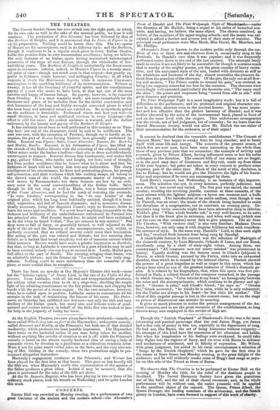THE THEATRES.
The Covent Garden Opera has now struck into the right path; in which, for its own sake as well as the sake of the musical public, we hope it will continue. The production of Don Giovanni has been followed by that of the Barbiere di Sivigga; and it Is announced that Le No= di Figaro is in to Ave preparation. Nothing could be better than this. The two operas of Mozart are his masterpieces, each in its different style; and the Barbiere, though it continues to be a regular stock-piece in every Italian theatre, holds this position from its own transcendent excellence; being, we believe, the only instance of an Italian opera having maintained uninterrupted possession of the stage all over Europe, through the vicissitudes of five- and-thirty years. The Barbiere di Siviglia is undoubtedly the finest comic opera in existence; inferior, indeed, to Mozart's Figaro in a merely musi- cal point of view--though not much even in that respect—but greatly su- perior in lightness, comic humour, and unflagging vivacity; in all which respects it rivals the Matrimonio Segreto, while it surpasses Cimarosa's masterpiece in the sparkling brilliancy of its instrumentation. Written at twenty, it has all the buoyancy of youthful spirits, and the constitutional gayety of a man who seems to have been, at that age, one of the most careless and happy of human beings. Its gayety, however, is far removed from frivolity. It is a most masterly work; not more remarkable for the freshness and grace of its melodies than for the skilful construction and rich harmonies of the long and highly-wrought concerted pieces in which the most busy and animated scenes are carried on. Its sympathetic action on the audience is irresistible. Performed where and how you will—in small theatres, in lame and mutilated versions in every language—the effect is still the same: the coldest audience is warmed, and the dullest enlivened, by the beauty and gayety of the Barbiere di Siviglia.
It has certainly never been so well performed in this country as on Tues- day last: not one of the characters could be said to be indifferent. The cast was new, with the exception of Persiani; though she is hardly an ex- ception, the part of Rosina having hitherto been generally performed by Grisi. Ronconi was Figaro; Salvi' Count Almaviva; Revere, Dr. Bartolo; and Marini, Basilio. Ronconi, in his delineation of Figaro, has filled up the sketch of the Italian libretto with the colouring of the original comedy. Other actors make the barber a buffoon—fantistic in dress and ridiculously extravagant in manner. Ronconi dresses him handsomely, and makes him a gay, gallant fellow, who rattles and laughs, not from want of thought, but from perfect confidence that he knows what he is about and that his lightness of heart will not betray him into any indiscretion. The sharp intelligence of his countenance, his keen and penetrating glance, his prompt self-possession, and alert wariness which lets nothing escape, all belong to the shrewd man of the world, the consummate master of intrigue, so well drawn by Beaumarchais; but these features are lost by an ordi- nary actor in the usual conventionalities of the Italian buffo. Salvi, though he did not sing so- well as Mario, was a better representative of the Count Alrnaviva; and he had the merit of restoring the serenade, "lo sono Lindero," corresponding to the " Je suis Linder" of the original play, which has long been habitually omitted, though it is beau- tiful, expressive, and full of Spanish character; and is, moreover, drama- tically necessary, being the disguised Count's reply to Rosina's desire to learn his name and condition. We never heard anything comparable to the richness and brilliancy of the embellishments introduced by Persiani into her principal airs. Had Rossini beard her, he might well have exclaimed, as he did when he heard Velluti, "Non pia conosco la mia musical" But they were so fall of fancy, so gracefully turned, so Well adjusted to the style of the air and the harmony of the accompaniments, and, withal, so perfectly executed, that no critical severity could resist their fascination. Her acting of the part was refined and delicate, but less amusing than Grisi's, as it lacked that broad simplicity and air of innocent naiveté which Grisi assumes. Revere would have made a greater impression as Bartholo, but that, so long as Lablache is remembered in a part which he may be said to have created, nobody else can hope to succeed in it. Lastly, Marini gave full effect to the part of Basilio. The cunning, cringing churchman, was an admirable picture; and the famous air "La calunnia" was truly mag- nificent. Nothing could be more satisfactory than the ensemble of the piece, or more cordial than its reception.
























 Previous page
Previous page